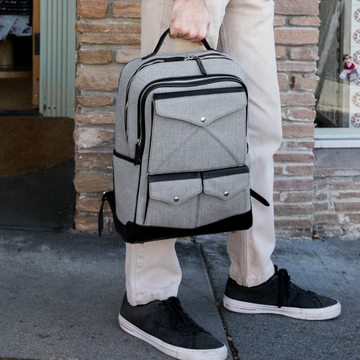In a world driven by trends and ever-changing styles, it's easy to overlook the impact of our fashion choices. Fast fashion, the rapid production of inexpensive clothing to respond quickly to the latest trends, has become a dominant force in the industry.
However, the consequences of our clothing choices go far beyond what meets the eye. In this blog, we'll delve into the real reasons why what you wear matters, shedding light on the environmental, ethical, and personal aspects of fast fashion.
The Environmental Impact:

Fast fashion is a major contributor to environmental degradation. The relentless pace of production leads to excessive use of resources, such as water and energy, and generates enormous amounts of waste. Cheap, disposable clothing often ends up in landfills, contributing to pollution and harming ecosystems.
By choosing sustainable fashion alternatives, you can reduce your carbon footprint and support eco-friendly practices that prioritize the health of our planet.
The Ethical Dilemma:
Behind the scenes of fast fashion lies a web of ethical concerns. Many brands prioritize profit over fair labor practices, leading to exploitative conditions for workers in developing countries. Sweatshops, low wages, and unsafe working conditions are all too common in the fast fashion industry.
Opting for ethically produced clothing ensures that your fashion choices align with values of social responsibility and fair treatment of workers.
Your Personal Style Statement:
What you wear is an extension of your identity. Fast fashion may offer a quick fix for staying on-trend, but it often lacks the quality and uniqueness that define personal style. Investing in timeless, well-made pieces not only contributes to a more sustainable wardrobe but also allows you to express your individuality.
Choose clothing that resonates with you, rather than succumbing to the fleeting trends dictated by fast fashion giants.
Vegan and Plant-Based Fashion:

The fashion industry is undergoing a transformation with the rise of vegan and plant-based fashion. Traditionally, clothing has relied on animal products like leather and silk, contributing to ethical and environmental concerns. Today, more brands are offering cruelty-free alternatives made from synthetic materials or innovative plant-based fabrics.
Opting for vegan and plant-based fashion not only aligns with ethical values by sparing animals from harm but also contributes to a more sustainable and eco-friendly industry. This shift reflects a growing awareness among consumers, driving positive change in the fashion landscape.
Conclusion:
In conclusion, the impact of our fashion choices goes far beyond aesthetics. Fast fashion may provide immediate gratification, but it comes at a significant cost to the environment, ethical standards, and personal style. By making conscious decisions about what we wear, we can contribute to a more sustainable and ethical industry. It's time to rethink our approach to fashion and embrace choices that align with our values.
Frequently Asked Questions (FAQs):
Is sustainable fashion more expensive?
Sustainable fashion can be perceived as more expensive upfront, but it often offers better quality, longevity, and ethical production practices. Investing in timeless pieces can save money in the long run as they tend to outlast fast fashion alternatives.
How can I identify sustainable fashion brands?
Look for brands that prioritize transparency in their supply chain, use eco-friendly materials, and adhere to fair labor practices. Certifications like Fair Trade and B Corp are good indicators of a brand's commitment to sustainability.
Can I still be trendy while avoiding fast fashion?
Absolutely! Trends can be embraced through second-hand shopping, swapping clothes with friends, or supporting sustainable fashion brands that incorporate current styles into their collections. Being trendy doesn't have to compromise ethical and environmental values.







